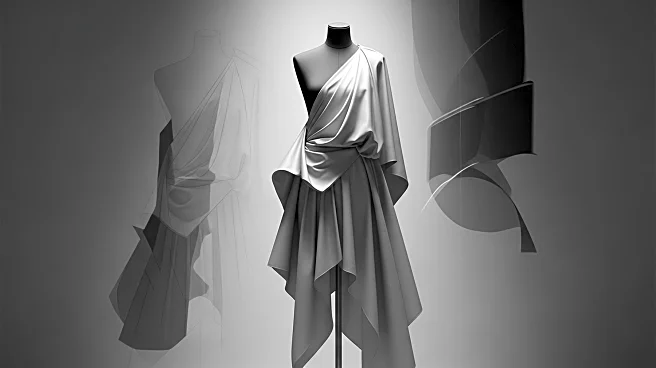What is the story about?
What's Happening?
Yohji Yamamoto, a renowned fashion designer, has expressed his dissatisfaction with the current state of the fashion industry, criticizing it for prioritizing profit over creativity. In a recent interview, Yamamoto lamented the industry's focus on financial gain, which he believes has led to a decline in creative innovation and quality. He highlighted the challenges faced by the industry, including the loss of skilled workers and the increasing reliance on less expensive materials like polyester. Yamamoto also voiced concerns about the impact of geopolitical conflicts and climate change on the world, expressing frustration with political leaders, including President Trump. Despite these challenges, Yamamoto remains committed to maintaining the integrity of his brand, focusing on creating high-quality, unique designs.
Why It's Important?
Yamamoto's critique of the fashion industry underscores a broader issue of 'greedflation,' where brands increase prices without delivering corresponding value. This trend could lead to a loss of consumer trust and a decline in brand loyalty. The disappearance of skilled workers and traditional techniques poses a threat to the industry's future, potentially leading to a homogenization of fashion. Yamamoto's comments also highlight the intersection of fashion with global issues like climate change and political instability, suggesting that the industry cannot remain isolated from these broader challenges. His commitment to creativity over profit serves as a reminder of the importance of maintaining artistic integrity in a commercialized world.
What's Next?
Yamamoto's focus on sustainability and quality may inspire other designers to prioritize these values, potentially leading to a shift in industry practices. As the fashion industry grapples with economic and environmental challenges, there may be increased pressure on brands to adopt more sustainable practices and support traditional craftsmanship. Yamamoto's influence could encourage a reevaluation of business models that prioritize short-term profits over long-term sustainability and creativity. The industry may also see a push for greater transparency and accountability in response to consumer demand for ethical and environmentally friendly products.
Beyond the Headlines
Yamamoto's critique raises ethical questions about the responsibility of fashion brands to their consumers and the environment. The industry's reliance on synthetic materials like polyester, which contribute to environmental degradation, highlights the need for more sustainable alternatives. Additionally, the loss of traditional skills and techniques raises cultural concerns about preserving heritage and craftsmanship. Yamamoto's emphasis on creativity and quality over profit challenges the prevailing business model in the fashion industry, suggesting a potential shift towards more ethical and sustainable practices.

















